Research @ the Beach
Research @ the Beach
Each semester, this online publication is produced to recognize faculty and students for their work. Our Spring 2024 issue of Research @ the Beach highlights ongoing faculty research and the 2024 Faculty Internal Multidisciplinary Grant, Mini-Grant, and Summer Stipend recipients. In this issue:
Discover how Hossein Sayadi is using artificial intelligence to drive innovation in computer science and engineering; Michelle Alancar is empowering individuals by emphasizing fitness, nutrition, and behvior modification; Madeleine Liseblad’s media history research; and how CPaCE and COE are partnering together to provide training to California’s local agencies.
More information can be accessed by clicking the topics below.
| Awardee | Project Title | Department | Award Type |
|---|---|---|---|
| Paul Laris | Increasing capacity and access at the River Ridge Ranch environmental field station | Geography | Mini-Grant ($5,000) |
| May Ling Halim | Waiting for Prince Charming: Young Children's Knowledge and Beliefs About Romantic Love | Psychology | Mini-Grant ($5,000) |
| Samar Needham | The Effect of Stress on Emotional Working Memory | Psychology | Mini-Grant ($5,000) |
| Houng-Wei Tsai | Androgen receptor regulation of sexual dimorphism in anxiety-like and cognitive behaviors in mice | Biological Sciences | Mini-Grant ($5,000) |
| Michelle Barrack | Evaluating energy availability using doubly labeled water and evaluating relationships with reported dietary intake and resting metabolic rate in female adolescent endurance runners | Family and Consumer Sciences | Mini-Grant ($5,000) |
| Nizan Shaked | Art Against the System | School of Art | Summer Stipend ($4,650) |
| Jeff Janisheski | Site-Specific Theatre Project with LA-Based Playwright, Paula Cizmar | Theatre Arts | Summer Stipend ($4,650) |
| Sam Anvari | UX/UI Research (Car Buck for UX and P-English for Typography and Linguistics) | School of Art | Summer Stipend ($4,650) |
| Claudia Barrulas-Yefremian | Balancing Act: The Challenges and Triumphs of Small Business and Women Entrepreneurship | Management | Summer Stipend ($4,650) |
| Heather Macias | “If you don't love yourself, how in the hell you gonna love somebody else?”: Teachers’ perceptions of the social-emotional learning embedded in drag | Teacher Education | Summer Stipend ($4,650) |
| Hossein Sayadi | To What Degree Can AI Assist? Exploring the Role of ChatGPT in Computer Science Education | CECS | Summer Stipend ($4,650) |
| Feike Leij | Transfer Functions to Quantify Water Flow in the Vadose Zone | Civil Engineering and Construction | Summer Stipend ($4,650) |
| Andrea Calabrese | Study of the Principles Governing the Response of Metamaterials for Structural Control | Civil Engineering and Construction | Summer Stipend ($4,650) |
| Parviz Yavari | Environmental Impact on High strength Aluminum Alloys | Mechanical and Aerospace Engineering | Summer Stipend ($4,650) |
| Hongzhao Liu | Development of a Novel Minimalist Autopilot System for Small Unmanned Aircraft: Capability Advancement after Feasibility Evaluation | Mechanical and Aerospace Engineering | Summer Stipend ($4,650) |
| Maryanne Diaz | Getting Sober with Satan: A Qualitative Analysis of the Satanic Temple Sober Faction | Criminology, Criminal Justice, and Emergency Management | Summer Stipend ($4,650) |
| Kevin Valenzuela | The Biomechanical Effects of Different Percussive Massage Modalities on Vertical Jump Performance and Knee Extensor Strength | Kinesiology | Summer Stipend ($4,650) |
| Joshua Cotter | Short-Duration Simulated Microgravity Alters Human Skeletal Muscle Myonuclear Morphology | Kinesiology | Summer Stipend ($4,650) |
| Kurt Escobar | The Effect of Creatine Supplementation on Acute Exercise Glycemic Control | Kinesiology | Summer Stipend ($4,650) |
| Tina Zhao | The impact of citizenship status and healthcare access among California’s immigrant Latinx communities on drug overdose mortality rates | Public Policy and Administration | Summer Stipend ($4,650) |
| Melissa Maceyko | Organizations Speaking Out: Impacts on the Passage of Discriminatory Policy & Legal Decisions | Anthropology | Summer Stipend ($4,650) |
| Loretta Ramirez | Get Back to Where You Once Belonged: A Chicana-Apache Professor’s Autoethnography on Racial and Rhetorical Belongings | Chicano and Latino Studies | Summer Stipend ($4,650) |
| San Bolkan | Student Success and Student Struggle: Using Latent Class Analysis to Determine Why First-Year Students Stop Out of College | Communication Studies | Summer Stipend ($4,650) |
| Amy Heyse | From ‘Lawlessness’ to ‘Racial Injustice’: Presidential Responses to Racialized Violence from Ford through W. Bush | Communication Studies | Summer Stipend ($4,650) |
| Christopher Shaw | “The Secret World of the Creole: Omissions, Evasions, and the Chameleonic Creole Code” | Comparative World Literature | Summer Stipend ($4,650) |
| Scott Winslow | Evaluating the Efficacy of Drone-Mounted LiDAR Sensors for Estimating Aboveground Biomass in California Blue Oak Woodlands | Geography | Summer Stipend ($4,650) |
| Sean Smith | The Pike and Prejudice: Gaming Spaces and Urban Transformation in Long Beach, California | History | Summer Stipend ($4,650) |
| Ulices Pina | Rebellious Citizens: Social Upheaval and Democracy in Revolutionary Mexico | History | Summer Stipend ($4,650) |
| Heather Rae-Espinoza | Using patient and carer insights to inform a real-world study of treatment experience with rare cancer | Human Development | Summer Stipend ($4,650) |
| Colleen Ahland | The Expression of Number in Africa: A Typological Overview | Linguistics | Summer Stipend ($4,650) |
| Michael Ahland | Compilation and Editing of Raw Data Appendices, Two-Language Dictionary, Corpus of Six Texts and Subject Index for Contracted Book (Due in Summer) | Linguistics | Summer Stipend ($4,650) |
| Gabriella Hancock | Conservation Psychology: Determining the Psychological Underpinnings of Animal and Habitat Pro-Conservation Behaviors to Promote Global Biodiversity | Psychology | Summer Stipend ($4,650) |
| Amy Wax | The Validation of a Scale to Measure Ambivalent Homoprejudice toward Lesbian Women at Work | Psychology | Summer Stipend ($4,650) |
| Paul Weers | Identification of the lipoprotein binding site in apolipoprotein III | Chemistry and Biochemistry | Summer Stipend ($4,650) |
| Enrico Tapvicza | Machine Learning of Nuclear Forces for Large-scale Molecular Dynamics Simulations in Chemically Complex Environments | Chemistry and Biochemistry | Summer Stipend ($4,650) |
| Applicant | College | Co-Applicant | College | Application Title |
|---|---|---|---|---|
| Lora Landon | CNSM | Paul Scotton | CLA | Detecting the Environmental Impacts of War in Ancient Greece |
| Min Gu | CED | Zakiya Atkinson | COTA | Investigating Inclusive Arts Practices: A Global Exploration of Arts, Disability, and Race |
| Jingyi Zeng | COE | Sarshar Arash | COE | Engaging Student Learning with Fluid Mechanics Activities in Introductory Teaching Labs |
| Eun Jung Chae | COE | Ga-Young Suh | COE | Multi-modal Approach to Analyze the Dynamics of the Inferior Vena Cava (IVC) |
| Sam Zeff | CHHS | I-Hung Khoo | COE | Developing an augmented reality based dynamic visual acuity assessment |
| Mortaza Saeidi | COE | Anna Lee | COE | 3D Printing of Graphene-Based Electrodes for Electrochemical Energy Storage Devices |
| Alex Klotz | CNSM | Siavash Ahrar | COE | Engaging Student Learning with Fluid Mechanics Activities in Introductory Teaching Labs |
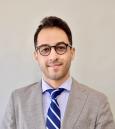
Hossein Sayadi, PhD
Assistant Professor
Department of Computer Engineering and Computer Science
College of Engineering
Driving Innovation in Computer Science and Engineering Through Artificial Intelligence
Dr. Hossein Sayadi is an Assistant Professor of Computer Engineering and Computer Science in the College of Engineering. His research primarily centers on areas of hardware security, Artificial Intelligence (AI) and machine learning, cybersecurity, computer architecture, and computer science education.

Michelle Alancar, PhD
Professor
Department of Kinesiology
College of Health and Human Services
Empowering Individuals Through Emphasizing Fitness, Nutrition, and Behavior Modification
Dr. Alencar, is a Professor in the Department of Kinesiology in the Option area of Fitness. She is an avid researcher and key opinion leader in the area of mobile health, telehealth, and insurance-reimbursable lifestyle coaching. Dr. Alencar got into her line of research because of a close personal experience in the journey of wellness by witnessing her mother’s battle with obesity and diabetes,. Dr. Alencar saw how broken the current healthcare system. With a focus on sick-care and prescription medications, there was no integration of the whole person. Current healthcare doesn’t even touch the areas that impact a person the most (nutrition, fitness, mental/emotional wellbeing, support). She sought out to see how holistic wellness can empower people to be their own advocates to a better health and quality of life through health coaching.
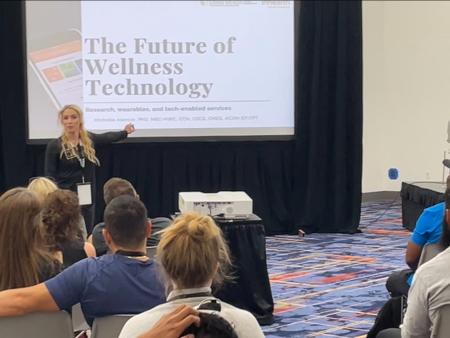
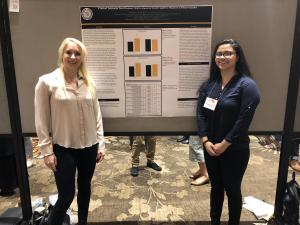

Madeleine Liseblad, PhD
Assistant Professor
Department of Journalism and Public Relations
College of Liberal Arts
An Award-Winning Combination: Collaborations and Media History Research
Dr. Madeleine Liseblad is an assistant professor in the Journalism & Public Relations Department. Prior to academia, she was a journalist and a PR professional. She conducts primarily historical and qualitative research focused on television news.
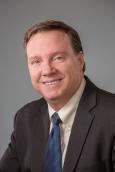
Tom O'Brien, PhD
Associate Dean
College of Continuing and Professional Education
Collegiate Partners: How CPaCE and COE Work Together to Support California's Local Agencies in Delivering Training
It’s likely that the least known and perhaps least understood College within CSULB is the College of Professional and Continuing Education (CPaCE). College of Professional and Continuing Education | CSULB CPaCE works with campus, business, community and international partners to offer a diverse range of degrees, professional development certificates, and short-and long-term international education programs. As a College, we are most visible when partnering with other academic units in assisting them with the development, marketing and administration of self-support degree programs; but we also play an important role in connecting the campus to the external partners who can help us better understand the needs of employers for not only degrees but also non-degree credentials. Partner input also helps us better align the changing demand for skills in the workplace with the education programs offered on our campus. All of this allows CPaCE to contribute in unique ways to the broader mission of the university and the goals of the Beach 2030 strategic plan.
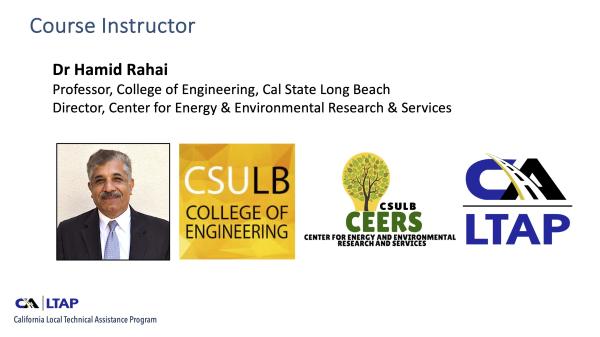
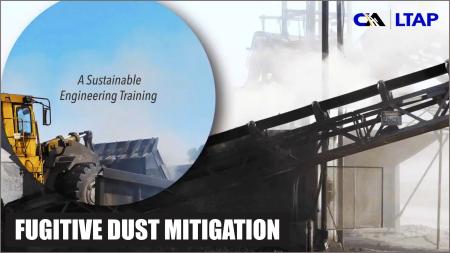

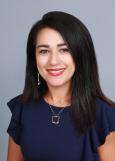
Banafsheh Behad, PhD
Associate Professor
Department of Information Systems
College of Business
Examining Applications of Operations Research and Management Science to Public Policy Questions
I am an Associate Professor of Information Systems in the College of Business. My research examines applications of Operations Research and Management Science to public policy related questions, such as negotiating pricing contracts for vaccines and mitigating the spread of fake news on social media.

Isacar Bolaños, PhD
Assistant Professor
Department of History
College of Liberal Arts
Historical Perspectives on the Varied and Uneven Effects of Contemporary Environmental Issues
As an undergraduate student majoring in History at the University of California, San Diego, I enrolled in several courses on the history of the Middle East. Through these courses, I developed an interest in the history of the Ottoman Empire. This empire existed between the fourteenth and early twentieth centuries, and at its height, it ruled parts of Europe, North Africa, and the Middle East. I was particularly fascinated by the fact that the history of the Ottoman Empire could provide important insights into many contemporary issues in the Middle East. That realization inspired my initial interest in the Ottoman roots of nationalist movements in the region, and as I began my doctoral training in History at Ohio State University, I thought that I would write a dissertation on this topic. However, over the course of my doctoral studies, I began thinking about Ottoman history in ways that I had not previously considered; I began to take seriously the role of environmental crises in shaping the empire’s past.
- “The Ottomans during the Global Crises of Cholera and Plague: The View from Iraq and the Gulf,” International Journal of Middle East Studies 51.4 (2019): 603-620.
- “Water, Engineers, and French Environmental Imaginaries of Ottoman Iraq, 1868-1908,” Environmental History 27.4 (2022): 772-798.
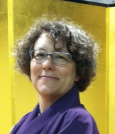
Lora Stevens-Landon, PhD
Professor & Chair of Earth Science
Department of Earth Science
College of Natural Science and Mathematics
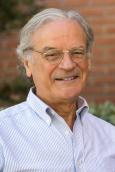
Paul Scotton, PhD
Professor
Classics Program
College of Liberal Arts
Advancing Digital Technologies in Education
Ever since she began work on her PhD 30 years ago, Lora Stevens’ research has focused on understanding past climate change, particularly droughts. She has worked in SE Asia, Iran, and North America. Her work often overlaps with events in human history, such as the rise and fall of civilizations, so it is a natural transition for her to collaborate with Dr. Paul Scotton to expand his research on Lechaion Harbor in Greece.
Paul Scotton began excavating at Ancient Corinth over 30 years ago. His archaeological career includes excavating at the Minoan site of Pseira, the Mycenaean sites of Mycenae and Gla, and the Roman site at Campo del Chiase.
The history of Lechaion is incredibly rich. As the primary port of Ancient Corinth, it served as a commercial hub for both ancient Greeks and Romans for over a millennium. It has been witness to many societal changes and was even the site of battles. Some of its history is documented in the ruins that are currently being excavated by Scotton and his team. But more information can be gleaned by analyzing the sediments in basins within the harbor for tell-tale signs of human activity.
Our initial joint project “Detecting the Environmental Impacts of War in Ancient Greece” received funding from CSULB ORED Multidisciplinary Grant. This project is looking at only a small slice of history at Lechaion Harbor to see if we can identify the effects of war and war-readiness in the ancient world. We know from historical and archaeological records when and where the fighting took place. Now we will use cores collected near the battle sites to look for traces of heavy metals in the sediment that are a by-product of early smelting. We aim to determine if a single multi-day battle using early armaments along with a decades-long state of war-readiness leave a measurable footprint on the environment.
The collaboration between our two disciplines is very exciting. There is so much potential there. Throughout history, humans have impacted their environments by modifying the landscape, altering the natural vegetation, and leaving behind pollution. In turn, their lives were also impacted by changes in their environment and climate. Unravelling these intersections provides a deeper understanding of how human societies have developed over the millennia and can provide a framework by which to measure modern impacts. Furthermore, the collaboration of two seemingly different disciplines, Classics and Earth Science, really highlights the power of interdisciplinary thinking and the potential advances that can be made when we step outside our comfort zones.
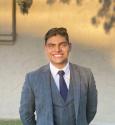
Carlos A. Fitch
Master of Arts in Equity, Education, and Social Justice
Border Frictions: A Qualitative Exploration of Queer Tranfronterizx Students at the Rural California Borderlands’ Higher Education Institutions
Thesis Chair: Dra. Lindsay Pérez Huber
CED Scholar Femtor: Dr. Betina Hsieh, University of Washington
Femtor: Dra. Vannessa Falcón Orta, SDSU-I
Graduate Research Summary
Carlos A. Fitch is a Master of Arts candidate in Equity, Education, and Social Justice whose thesis explores Queer Transfronterizx students navigating higher education, making agency of their Queer bodies, and resisting the militarized border along the rural borderlands of California – Baja California. This study is novel in its approach, and its findings can both transform the understanding of Queer Transfronterizx students in higher education and inform universities on how to better support this community of students.
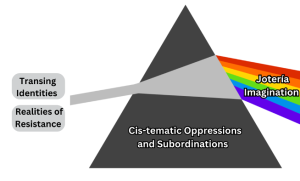
Fitch utilized testimonio (Pérez Huber, 2009) and pláticas (Fierros & Delgado Bernal, 2016) research methods that (a) disrupt colonial Eurocentric epistemologies, (b) are grounded in Critical Race Feminista praxis and Chicana Feminist Epistemologies (Delgado Bernal & Alemán, 2017; Delgado Bernal & Villalpando, 2002; Delgado Bernal, et. al., 2006; Morága & Anzaldúa, 1981), and (c) acknowledge the diverse theorizing and methodological perspectives of Communities of Color. Fitch’s approach expanded the pláticas method to capture the intersection of jotería and Queerness by combining Chicana Feminist pláticas with jotería pláticas as theorized by González et al. (2023) to create pláticas atravesadas. His goal was to provide a meaningful analysis of the layered oppressions experienced by Transfronterizx students with various minoritized identities, including identifying as a Queer of Color, in a rural border context.
Fitch recruited collaborators to participate in his study through convenience and snowball sampling methods. Seven higher education students who identified as Queer and Transfronterizx, provided testimonios. Of those seven, Fitch conducted a plática atravesada with three collaborators. Fitch relied on a Jotx Critical Race Hypo as a pedagogical tool to frame the dialogue of the plática session.
Drawing from both Latinx Critical Race Theory (LatCrit) (Solórzano & Delgado Bernal, 2001; Solórzano & Yosso, 2001) and Jotería Studies (Álvarez & Estrada, 2019; Ochoa, 2015), Fitch analyzed his data through a racist nativism conceptual framework that pinpoints everyday racism as an integral component of the everyday transnational journey of Queer Transfronterizx students (Pérez Huber et al., 2008; Pérez Huber, 2010), while positioning their homeland connection at the forefront of this border-crossing experience. Four themes emerged: 1) transing identities, 2) cis-tematic oppression and subordinations, 3) realities of resistance, and 4) jotería imagination (See Figure 1). Overall, Queer Transfronterizxs experience a spectrum of struggles and joy that are impacted by the layered and complex encounters with larger social systems as is immigration, education, and familial dynamics.
Queer Transfronterizx are constantly traversing the US-México borderlands and the borders of gender, sexuality, immigration status, and cis-heteronormative performance. When crossing the US-México borderlands, Queer Transfronterizxs experience homophobia, queerphobia, transphobia, citizenship questioning, violations to their humanity, and other overt notions of oppression from fellow citizens and both immigration and law enforcement officers. As noted by Fabián, one of Fitch’s collaborators, these experiences of oppression are ingrained in their hypervigilant consciousness of everyday routines:
“For a long time, it was just a constant state of worry of like, "¿Qué tal si nos quitan algo?"[1]. This constant state of being scared, even if we had nothing. It was a very low key, carceral, border crossing. There's so many things that just make you get scared. There's dogs, all these things. Seeing people with weapons or even being scared. I think I was scared for a long time because my mom had a residency status. [If] she broke the law, she would be taken away from that residency right. It wasn't until we got that citizenship [...] that all those worries aren't there anymore. They're still there in terms of when, I'm like, voy a cruzar para atrás [to México][2], I get scared. I start to think, "Shoot, do I have anything in the car?"”
Once inside the ivory tower of higher education, Queer Transfronterizxs experience systematic invisibility of the Queer Transborder self, including the erasure of this identity in strategic planning of academic and student affairs practices that ignore and diminish Queer Transborder students’ struggles. This is noted through Miguel’s narrative, one of Fitch’s collaborators who experienced homophobia and hate discourse in the community college he attended:
“There was this little moment at [community college] where they [Christian students] were putting up signs and posters saying 10 reasons why you shouldn't accept same sex marriage or something… articles everywhere, a bunch of articles next to each other all over the school, and it was against LGBT. It was basically hate speech. I remember people were complaining to the school about it, and they just said, "Oh, no, that's allowed because it's free speech." They just let that happen […] I remember I would take them down, and I would tell my friends to take them down […] pretty sad that the school wouldn't do anything about something pretty harmful towards the Queer community.”
Queer Transfronterizxs often articulate their human and cultural agency and transformational resistance through their intersectional identities and the pride they carry in spaces. Queer Transfronterizxs mobilize themselves to create community, engage in border consciousness and institutional accountability, and enact collective resistance through language, gender expression, and understandings of sexual pleasure. In essence, Luisito, one of Fitch’s collaborators who serves in the city council as the first openly Transfluid Latina mayor in the state of California, noted:
“It took me a while to get back into the university system, primarily because of my connection to political activism here in this county. When I was at UC Santa Cruz, I would go back and forth the eight-hour drive […] I would go back and forth every other two weeks just to continue being involved in Imperial County, specifically with Black Lives Matter.”
Twofold, Luisito reflected on their perceived privilege as a Transfluid Latina Transfronteriza given the proximity to México, access to two nations and two Queer scenes, while signaling the practices to challenge the cis-heteronormative system:
“For anybody that crosses the border, the LGBT experience is that people use their cumulative wealth privilege and border-crossing privileges, those that have legal status to be able to express their LGBT [self], their gender rotations, and their sexual identities on the other side of the border where it's seen as more anonymous.”
Queer Transfronterizxs exhibited how Queer fluidity, through gender and sexual identities, linguistic choices, pronoun flexibilities, and their political positionalities pushed boundaries of borderlands to expand knowledge within their households, intimate circles, classrooms, and society-at-large.
Fitch’s research demonstrates the racialized journeys of Transfronterizx students as they navigate the challenges imposed by the enforcement of racist and nativist practices in U.S. higher education and immigration systems. He gives voice to the Latinx students with intersecting minoritized identities traversing the US-México borderlands and brings to light their experiences with (in)equitable educational institutions as are state-funded universities. These experiences of the Transfronterizx student-collaborators are in many ways like his own.
For three years of high school and his entire higher education journey, Fitch crossed the US-México border to remain connected to his deported parents who live on the Mexican side and to receive an American education. While Fitch was earning his bachelor’s at San Diego State, he learned of Transfronterizx student identity from the Director of their Cross-Cultural Center, Dr. Vannessa Falcón Orta. It was then that he was finally able to connect and find a Latinx cultural term where he fit, a term that represented his experience – a Transfronterizo student.
Transfronterizx students do not exist only at the US-México border, they cross borders around the globe that have been created to separate communities. More research is needed to understand the dimensions of Transfronterizx students’ experiences, their sociopolitical contexts, the immigration inequities, and sociocultural discrimination that impact them, and the effects of nativism on educational policies and Transfronterizx students. Fitch’s research lays a foundation – it is a start.
References
Álvarez, E. & Estrada, J. (2019). Jotería studies. In H. Chang (Ed.), Global encyclopedia of lesbian, gay, bisexual, transgender, and queer (LGBTQ) history (pp. 863–867). Charles Scribner & Sons.
Delgado Bernal, D., & Alemán, E. (2017). Transforming educational pathways for Chicana/o students: A critical race feminista praxis. New York, NY. Teachers College Press.
Delgado Bernal, D., & Villapando, O. (2002). An apartheid of knowledge in academia: The struggle over the “legitimate” knowledge of faculty of color, Equity & Excellence in Education, 35 (2), 169-180.
Delgado Bernal, D., Elenes, C.A., Godinez, F., & Villenas, S. (2006). Chicana/Latina education in everyday life: feminista perspectives on pedagogy and epistemology. New York, NY. Suny Press.
Fierros, C. O. & Delgado Bernal, D. (2016). Vamos a platicar: The contours of pláticas as Chicana/Latina feminist methodology, Chicana/Latina Studies, 15 (2), 98-121.
González, A., Orozco, R., & González, S. (2023). Joteando y mariconadas: theorizing queer pláticas for queer and/or trans Latinx/a/o research, International Journal of Qualitative Studies in Education, 1 (1). 1-17.
Morága, C. & Anzaldúa, G. (1981). This Bridge Called My Back: Writings by Radical Women of Color. Fourth edition. Albany State University. New York Press.
Ochoa, J. (2015). Shine bright like a migrant: Julio Salgado’s digital art and its use of Jotería. Social Justice: A Journal of Crime, Conflict, & World Order, 42(3-4), 184–199.
Pérez Huber, L., Benavides López, C., Malagón, M. C., Vélez, V., & Solórzano, D. G. (2008). Getting beyond the “symptom,” acknowledging the “disease”: Theorizing racist nativism. Contemporary Justice Review, 11(1), 39–51.
Pérez Huber, L. (2009). Disrupting apartheid of knowledge: testimonio as methodology in Latina/o critical race research in education, International Journal of Qualitative Studies in Education, 22 (6), 639-654.
Pérez Huber, L. (2010). Using Latina/o critical race theory (LatCrit) and racist nativism to explore intersectionality in the educational experiences of undocumented chicana college students, Educational Foundations, 77-96.
Solórzano, D. & Delgado Bernal, D. (2001). Examining Transformational resistance Through a Critical Race and Latcrit Theory Framework: Chicana and Chicano Students in an Urban Context, Urban Education, 36 (3), 308-342.
Solórzano, D. & Yosso, T. (2001). Critical race and LatCrit theory and method: Counter-storytelling, International Journal of Qualitative Studies in Education, 14(4), 471-495.
[1] Translation: “what if they take something away from us?”
[2] Translation: “I’ll cross back [to México]”
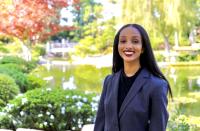
Miriam Adhanom:
I entered CSULB as a Music Education and Vocal Performance major in the Fall of 2021. In the following academic year, I was taking a music history course and assigned a research paper on a musical tradition not covered in our class. As a second-generation Eritrean-American woman, I was beyond excited to write about Eritrean music. I would meet with the instructor, Dr. Ray Briggs, with questions about music history, music and academia, and how I might approach the study of my own musical heritage as an Eritrean-American. Recognizing my potential for graduate-level research, Dr. Briggs suggested that I apply for the Mellon Mays Undergraduate Fellowship (MMUF). I applied and was one of only four sophomores and juniors awarded the MMUF for the Fall 2022-Spring 2023 application cycle.
My research topic developed during the Summer and Fall of 2023. With Dr. Briggs as my MMUF mentor, I wrote a 23-page research paper titled “‘My Country, The Country of Heroes’”: Resilience, Resistance, and Music During the Eritrean Struggle for Independence.” In this paper, I explored the uses of music and its socio-political implications in the 30-year effort to achieve Eritrean independence from Ethiopia. In addition, to gain insight into relatable conceptual frameworks, I studied other revolutionary movements across the world and how the arts and culture affected social change. I applied some of those concepts to the Eritrean context. My methodological approach included drawing from my background as a musician to analyze the musicological features of selected songs, interviewing an iconic musician who experienced the war period and wrote music in response to it, and familiarizing myself with modern Eritrean history. I applied to several PhD Ethnomusicology and Musicology programs with this manuscript and was accepted to both UCLA and the University of Michigan to further my scholarly endeavors.
My research will contribute to the diminishment of the gap in current scholarship on Eritrean music and culture. In music and general academia, East Africa is underrepresented in scholarly writing. Moreover, Eritrean music is one of the least studied topics in Eritrean cultural studies. My scholarship will enhance the musical and academic community’s understanding of how Eritrean national identity was formed. I want to help broaden the definition of what African music is, and what it means to be African. Ultimately, I want my research to unite the diaspora community and document how Eritreans outside their home country are acclimating to their new environments.

Mariana Villegas
My research is embedded within my queer identity and simultaneously, I recognize that I have privileges as a cis-gender woman. My intention is to uplift trans voices and stories through my research to ultimately celebrate their unique lives. Although the current political narrative is hostile to the trans community, my focus is to bring their joy and creativity to the forefront of scholarship. As a queer and gender-questioning individual, I credit my exploration to those brave enough to be non-conforming. Additionally, the passion behind my research is credited to my love of music coinciding with my curiosity in performance using sexuality. I'm very excited to continue my research and creativity under the Gender Studies Ph.D program at UCLA!
My research explores how a transfemme rapera from Puerto Rico, Villano Antillano, engages with reggaeton as a queer and trans individual. Specifically, how does her presence in the man-dominated and phallocentric genre transform its gender and sex politics? Drawing theoretical concepts from Deborah R. Vargas' lo sucio and Marcos Gonsalez' trans/queer of color spectacular obfuscation, I conjugate Antillano's lyrics and visuals from her song, Vocales into my analysis.
My intention with my research is to celebrate the creativity and innovation from trans individuals and commemorate their accomplishments in queerifying old and new concepts and diversifying how we interact with potential realities. I envision this potential in CSULB culture, transcending into academic culture (and beyond!).
Graduate Acceptances
| Name | Major | Graduation | Graduation School | Research Activity |
|---|---|---|---|---|
| Anjelica Waight | Kinesiology: Exercise Science | Spring 2024 | Degree: DPT/Ph.D. Washington University, St. Louis | Research Assistant, Dr. J. Dawson |
| Luigi Gutierrez | Chemistry | Spring 2024 | Degree: Ph.D. University of Indiana | Research Assistant, Dr. E. Marinez |
| August Stine-Woods | Psychology | Spring 2024 | Degree: Ph.D. Auburn University | Research Assistant, Dr. A. Johnson |
| Desiree Blanco Romero | Psychology | Spring 2024 | Degree: MSW University of California, Los Angeles | Research Assistant, Dr. C, Ahrens |
| Erick Gutierrez | Chemical Engineering | Spring 2024 |
Degree: MA Arizona State University |
Research Assistant, Dr. H. Tavassol |
| Christian Carrillo | Psychology | Spring 2024 |
Degree: MA CSULB |
Research Assistant, Dr. S. Needham |
| Kylie Yant | Biology | Spring 2024 | Degree: Biology Certificate CSULB | Research Assistant, Dr. J. Brusslan |
Pending Graduate and Post Baccalaureate Programs
| Name | Major | Graduation | Graduate School | Research Activity |
|---|---|---|---|---|
| Miontranese Green | Applied Statistics | Spring 2024 | M.A. CSULB (pending) | University of California, Los Angeles(UCLA) Research in Industrial Projects for Students (RIPS) |
| Dylan Kurz | Sociology | Spring 2024 | Degree: Ph.D. Reviewing offers from UC Irvine, University of Massachusetts, Portland State University | UHP and Sociology Honors |
| Scott Tomlinson | Business Administration: Finance & Marketing Concentrations | Fall 2023 | Degree: Post baccalaureate Northwestern (pending) | N/A |
| Kimberly Ayala | Biomedical Engineering | Spring 2024 | Pending | Dr. Ga-Young Kelly Suh |
| Yeraldine Polo | Nutrition and Dietetics | Spring 2024 | Degree: MPH CSULB (pending) | Advancing Nutrition Development through Alliances for Education and Leadership (ÁNDALE) |
| Ayoola Fadonougbo | Biomedical Engineering | Spring 2024 | Degree: Postbaccalaureate (pending) | UHP Honors Thesis |
Graduates in the Industry
| Name | Major | Graduation | Research Activity |
|---|---|---|---|
| Andee Gonzalez | Management Info Systems | Spring 2024 | UHP Honors Thesis |
| Savanna Hernandez | Social Work | Spring 2024 | UHP Honors Thesis |
External Research Experiences for Undergraduates (REU)
| Name | Major | Summer Research 2024 |
|---|---|---|
| Maylia Brown | Psychology | University of Michigan(UM) Summer Research Opportunity Program (SROP) |
| Makana Woods | Kinesiology: Exercise Science | University of Michigan (UM) Summer Research Opportunity Program (SROP) |
| Darrell White | Rhetoric and Composition | Rutgers University (pending) |
| Jacob Nguyen | Psychology |
CSULB McNair Summer Research Internship Program University of Souther California (USC) Summer Research (pending) |
| Mika Tomaya | Social Work |
CSULB McNair Summer Research Internship Program UCI Summer Research (Pending) |
| Martin Pelayo | Computer Science | University of Michigan (UM) Summer Research Opportunity Program (SROP) |
| Aline Curel-Silva | Marine biology |
CSULB McNair Summer Research Internship Program University of California San Diego (UCSD) Summer Research (Pending) |
| Jose Pineda | Physics | Harvard University Summer Research |
2023 - 2024 New McNair Cohort and Research Activity
| Name | Major | Summer Research Activity 2024 |
|---|---|---|
| Viviana Hernandez | Communication |
CSULB McNair Summer Research Internship Program UHP 496 Enrollment |
| Alejandro Duran | Biochemistry |
CSULB McNair Summer Research Internship Program UHP 496 Enrollment |
| Natalie Vega | Psychology |
CSULB McNair Summer Research Internship Program UHP 496 Enrollment |
| Danny Sarmiento | Mechanical Engineering |
CSULB McNair Summer Research Internship Program UHP 496 Enrollment |
| Heiddy Ussery | Sociology |
CSULB McNair Summer Research Internship Program UHP 496 Enrollment |
| Shelly Fonseca | Accounting |
CSULB McNair Summer Research Internship Program UHP 496 Enrollment |





